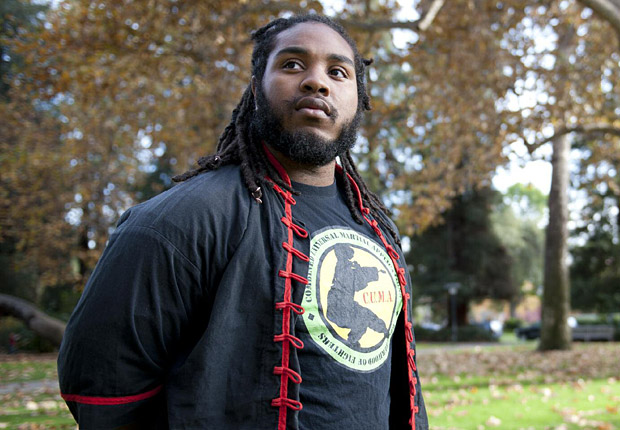 As a boy growing up in Chicago, Laurence Pommells ’11 begged his mother for a year before she agreed to sign him up for martial arts lessons. Looking back, he doesn’t begrudge her. She just wanted to make sure he would stick with it.
As a boy growing up in Chicago, Laurence Pommells ’11 begged his mother for a year before she agreed to sign him up for martial arts lessons. Looking back, he doesn’t begrudge her. She just wanted to make sure he would stick with it.
Mom needn’t have worried. From the age of 7, Pommells has been wrapped up in the martial way of life, practicing, over time, tae kwon do, Shaolin chu’an fa kung fu, capoeira and more. “I kept at it because I enjoyed it,” says Pommells, who has worked as an instructor at a Chicago-area kung fu studio. “I loved the form, I loved the discipline. It spoke to me, it spoke to my soul.”
From the start, Pommells drew inspiration from the 1985 Berry Gordon film, The Last Dragon, in which a young Black man “goes on a quest to discover a master to take him to the highest level in the martial arts only to discover the master he was looking for was within himself.” In his own life, Pommells went on to encounter a multiracial cast of instructors and students as he pursued various forms of Asian martial arts. Still, by the time he reached high school, a thought was hanging at the back of Pommells’ mind: “Are there any African martial arts?”
Of course there are. History, he notes, is the story of war and conflict, and every culture has its fighting systems. As he settled in at Pomona College and settled on a major in Africana studies, Pommells began to take a systematic look at the African continent’s many forms of martial arts, which range from ancient
Egyptian fighting systems to Zulu stick fighting. For a Summer Undergraduate Research Project, “Discovering African Martial Arts,” he visited and interviewed instructors in Atlanta, Chicago and Detroit. Later, he attended a conference, put on by Detroit-based instructor Kylindi Lyi, on the relevance of African martial arts today.
Pommells is particularly interested in capoeira, an African-rooted fighting system that was introduced to Brazil by enslaved Africans. The use of music, an emphasis on improvisation and the absence of a definitive ranking system set capoeira apart from some other martial arts that are familiar in the U.S. “It is a different feeling when I practice capoeira,” he says. “It makes me feel closer to my ancestors. My spirit—I can feel something welling up inside of me.”
Graduating this year, Pommells plans to go on to graduate school for a degree in Africana studies—and he plans to keep at a mixture of martial arts to stay in the right frame of mind. “When I stop, my grades fall,” he says. “When I practice, my grades rise again.”